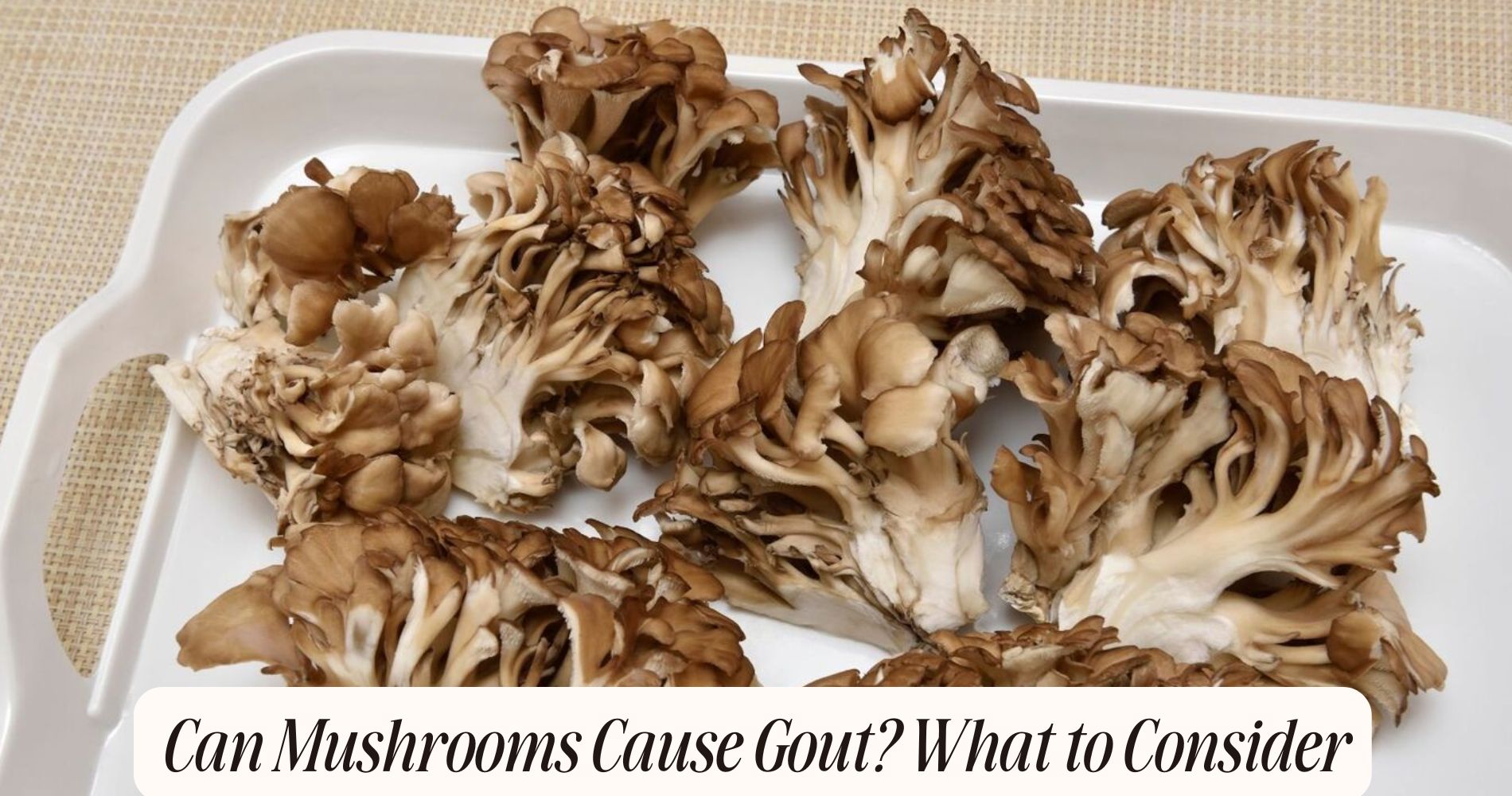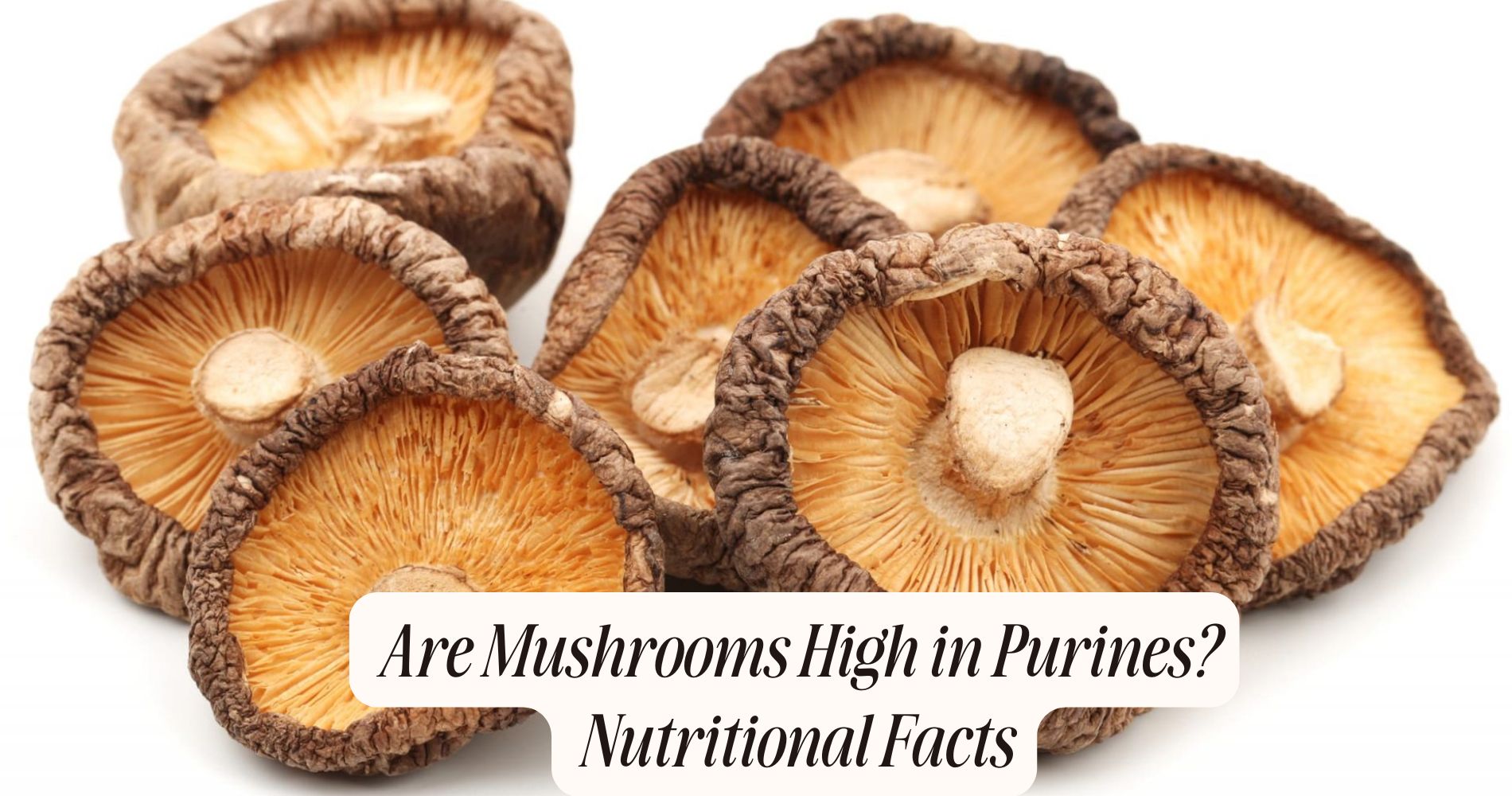
Can Mushrooms Cause Gout? What to Consider
Can mushrooms cause gout? Mushrooms can be part of a gout-friendly diet, but you need to take into account their purine content. Varieties like button and shiitake mushrooms are low in purines and may even help manage uric acid levels. In contrast, chanterelles have higher purine levels, so moderation is essential. Cooking methods like steaming can further reduce purines and enhance their health benefits. Pay attention to how mushrooms affect your symptoms, as individual responses can vary. Balancing your intake with other low-purine foods is wise. There's a lot more to explore about managing gout effectively, so keep discovering!
Understanding Gout and Its Causes
Gout is a form of inflammatory arthritis that occurs when uric acid builds up in the blood, leading to painful crystal formation in the joints. Understanding the causes of gout is vital for managing its symptoms.
Gout triggers often include certain dietary habits, like consuming high-purine foods such as red meat and shellfish. These dietary choices can elevate uric acid levels, particularly if your kidney function is compromised, making it harder for your body to excrete excess uric acid.
Inflammation factors, including obesity and alcohol consumption, can also exacerbate gout attacks. Your lifestyle choices, such as inactivity or poor hydration, further impact your risk. Proper hydration is critical, as it helps your kidneys flush out uric acid more effectively.
Additionally, genetic predisposition plays a role, with some individuals being more susceptible to gout due to a family history of the condition. Understanding these metabolic processes and how they interact with your habits can empower you to make informed decisions.
Nutritional Profile of Mushrooms
When managing gout, dietary choices can greatly influence your condition. Incorporating mushrooms into your meals can offer several nutritional benefits. These fungi are low in calories and rich in essential nutrients, making them an excellent addition to a balanced diet.
They're packed with vitamins such as B vitamins, which support energy metabolism, and minerals like selenium and potassium, important for overall health.
Mushrooms also contain antioxidants, which can help combat oxidative stress in the body. Their high fiber content promotes digestion and may contribute to a feeling of fullness, which can be beneficial if you're trying to maintain a healthy weight.

In terms of culinary uses, mushrooms are incredibly versatile. You can sauté them, grill them, or add them to soups and salads, enhancing flavor without adding excessive calories. This versatility allows you to incorporate them into various dishes, making it easier to enjoy their health benefits.
While mushrooms can be a nutritious addition to your diet, it's important to reflect on your overall dietary patterns and how they fit into your gout management plan. Balancing mushroom intake with other foods is key to maintaining ideal health.
Purines and Their Role in Gout
Understanding purines is essential for managing gout, as these compounds break down into uric acid in your body.
High levels of uric acid can lead to painful flare-ups, so knowing which foods contain purines can help you make informed dietary choices.
In this section, we'll explore various purine sources and their impact on uric acid levels.
Understanding Purine Sources
Purines are naturally occurring substances found in many foods, and they play an essential role in the body's metabolic processes. When you consume purines, your body breaks them down into uric acid. While purines are present in various foods, it's vital to understand which sources contribute more greatly to your dietary balance, especially if you're concerned about gout.
Different mushroom varieties contain varying amounts of purines. For instance, shiitake and portobello mushrooms have moderate purine levels, while others, like white button mushrooms, tend to be lower.
Including mushrooms in your diet can provide valuable nutrients without drastically increasing your purine intake, but moderation is key.
Incorporating a wide range of foods while monitoring purine levels can help you maintain a healthy dietary balance. Focus on consuming low-purine foods such as fruits, vegetables, and whole grains, alongside limited amounts of moderate-purine sources like certain mushroom varieties.
Impact on Uric Acid
Many people may not realize how purines directly influence uric acid levels in the body, which is essential for managing gout. Purines are compounds found in many foods, and when your body breaks them down, uric acid is produced. Elevated uric acid levels can lead to gout flare-ups, so understanding dietary sources is critical.
Different mushroom varieties contain varying amounts of purines. For instance, while some mushrooms like shiitake and button mushrooms have moderate purine levels, others, such as portobello, can be higher. If you're managing gout, it's important to evaluate how incorporating these mushrooms into your diet might affect your uric acid levels.

Research suggests that a diet low in purines can help reduce the risk of gout attacks. However, mushrooms also provide health benefits, including antioxidants and vitamins. Balancing your intake is essential.
You don't have to eliminate mushrooms entirely, but being mindful of the quantities and types you consume can help maintain stable uric acid levels. Always consult with a healthcare provider to tailor dietary choices to your specific needs and health conditions.
Types of Mushrooms and Purine Levels
When managing gout, understanding the purine content in different types of mushrooms is essential.
Some mushrooms are low in purines and can be safe choices for your diet, while others may have higher levels that could exacerbate your condition.
Purine Content Comparison
Understanding the purine content in different types of mushrooms can help you make informed dietary choices, especially if you're managing gout. While mushrooms are generally low in purines compared to other foods, the levels can vary considerably among mushroom varieties.
For instance, shiitake mushrooms contain moderate purine levels, typically around 50-75 mg per 100 grams. On the other hand, portobello and button mushrooms are considered low in purines, with levels around 10-20 mg per 100 grams. This means you can enjoy these types more freely without considerably raising your uric acid levels.
Conversely, some mushroom varieties, like chanterelles, may have slightly higher purine levels, so it's wise to consume them in moderation if you're sensitive to purines.
It's crucial to recognize that individual responses to purines can vary, so monitoring your body's reaction to different mushroom varieties is essential.
Safe Mushroom Choices
Choosing the right types of mushrooms can make a significant difference in managing gout symptoms. While mushrooms do contain purines, some varieties have lower levels, making them safer options for those concerned about gout. For instance, safe mushroom varieties include button mushrooms, shiitake, and portobello. These types are generally regarded to have moderate purine content compared to others.

When incorporating mushrooms into your diet, it's crucial to reflect on mushroom cooking methods. Cooking can help reduce purine levels, making it a wise choice for gout management. For example, sautéing or steaming mushrooms can be effective methods, as they allow for flavor enhancement without adding excessive purines.
In contrast, avoid mushrooms with high purine content, such as certain wild mushrooms, which can exacerbate gout symptoms. Always pay attention to your body's reactions when trying new varieties.
How Mushrooms Affect Uric Acid
Mushrooms can play a surprising role in managing uric acid levels, which is vital for those dealing with gout. Various mushroom varieties, like shiitake and maitake, are low in purines, the substances that can lead to increased uric acid production in your body. By incorporating these mushrooms into your diet, you may help maintain healthier uric acid levels.
Research suggests that certain compounds found in mushrooms, such as polysaccharides and antioxidants, may also contribute to reducing inflammation, which is a key factor in gout flare-ups. These compounds can support your overall joint health and improve your body's ability to manage uric acid effectively.
However, it's significant to mention that individual responses to different foods can vary. While most mushrooms are safe and beneficial for lowering uric acid levels, some people may have specific sensitivities.
As a result, if you're unsure how mushrooms affect you personally, it's always wise to consult with a healthcare professional. Remember, balance is essential when managing gout, and incorporating a variety of low-purine foods, including mushrooms, can be part of a well-rounded dietary strategy.
Individual Responses to Foods
While it's essential to incorporate healthy foods into your diet, individual responses to those foods can vary greatly. Personal sensitivities play a significant role in how you react to certain foods, including mushrooms. Your dietary habits, shaped by your lifestyle choices, also influence these responses.
For instance, if you have a history of specific health conditions, like gout, your body may process certain foods differently. Genetic factors can further affect your metabolic responses to various foods, including mushrooms. Some people may have genetic predispositions that lead to heightened sensitivity to purine-rich foods, which could impact uric acid levels.
Additionally, food interactions can modify how your body metabolizes certain nutrients, leading to varying effects on your overall health. Understanding your individual tolerances is vital for making informed dietary choices. Monitoring your body's reactions to different foods can help you identify what works best for you.
Ultimately, it's important to approach your diet with an awareness of these individual differences, tailoring your food choices to suit your unique health profile and lifestyle.
Dietary Considerations for Gout Sufferers
When managing gout, it's essential to understand the purine content of the foods you eat. Certain foods can elevate uric acid levels, exacerbating your symptoms, while others may help reduce inflammation.
This guide will highlight recommended food choices to support your dietary needs effectively.
Purine Content Analysis
Understanding the purine content in foods is essential for managing gout effectively. Purines are compounds found in many foods that can break down into uric acid, potentially triggering gout attacks. When evaluating mushroom varieties, it's important to know their purine levels. Different types of mushrooms contain varying amounts of purines, which can influence your uric acid levels.
For example, some studies suggest that shiitake and portobello mushrooms have moderate purine content, while others like button mushrooms are lower in purines. This means that while mushrooms can be a healthy part of your diet, their purine metabolism might affect your condition.

If you're already dealing with high uric acid levels, it's wise to monitor your mushroom intake. Incorporating low-purine foods into your diet can help minimize the risk of gout flare-ups. You might want to reflect on keeping a food diary to track how different mushroom varieties affect your symptoms.
Recommended Foods Choices
Managing gout effectively involves making smart food choices that support overall health while minimizing uric acid levels. When considering your diet, aim for a variety of foods that promote a dietary balance.
Many people wonder about mushroom varieties, as they can be a nutritious addition to your meals. While mushrooms do contain purines, their levels are relatively low compared to other high-purine foods. Including moderate amounts of mushrooms, such as button or shiitake, can provide valuable nutrients without greatly impacting uric acid levels.
In addition to mushrooms, focus on consuming low-fat dairy products, whole grains, fruits, and vegetables. Foods rich in vitamin C, like oranges and strawberries, can help lower uric acid levels.
Stay hydrated by drinking plenty of water, which aids in flushing out excess uric acid.
Avoid high-purine foods, like red meat, organ meats, and certain seafood, as they can trigger gout attacks. Limiting processed foods and sugary beverages is essential too.
Recommendations for Mushroom Consumption
Incorporating mushrooms into your diet can be beneficial, but moderation is key, especially for those prone to gout. While certain mushroom varieties, such as button, shiitake, and portobello, are low in purines, others like more exotic types may not be. It's crucial to choose mushroom types wisely to manage your gout risk.
When preparing mushrooms, consider your cooking methods. Steaming or sautéing mushrooms can help retain their health benefits while minimizing added fats or calories. Avoid heavy sauces and high-sodium seasonings, as these can contribute to other health issues.
Roasting or grilling are also excellent options, offering rich flavors without compromising nutrition.
In addition to being a low-calorie food, mushrooms provide essential vitamins and minerals, which can enhance your overall health. However, it's important not to overindulge, as excessive consumption of any food can lead to unwanted effects.
Aim to include mushrooms as part of a balanced diet, alongside other low-purine foods, to maintain your well-being. By making informed choices about mushroom varieties and cooking methods, you can enjoy their benefits while keeping your gout in check.
Other Foods Influencing Gout
Certain foods can considerably influence gout flare-ups, and recognizing their impact is essential for managing the condition.
Vegetables generally have positive effects on gout, but high-purine varieties like asparagus and spinach could have some implications.
Dairy, particularly low-fat options, may help reduce uric acid levels, making their effects beneficial.
Alcohol influence is significant; beer and spirits are linked to increased gout risk, whereas moderate wine consumption seems less harmful.
Hydration is vital, as drinking plenty of water can help flush uric acid from your system.
When considering legumes, they've moderate purine levels but are generally safe and can be included in your diet.
However, seafood risks should be noted; shellfish and certain fish like sardines may exacerbate gout symptoms.
Red meat consumption is another concern, as high-purine meats can trigger flare-ups.
Processed foods, often high in sugars and unhealthy fats, can also contribute to inflammation and should be limited.
Managing Gout Through Lifestyle Changes
Lifestyle changes play an essential role in controlling gout and minimizing flare-ups. You can start by adopting effective lifestyle modifications that include improved dietary habits. Focus on consuming low-purine foods, and consider meal planning to guarantee you're eating well-balanced meals. Food tracking can help you monitor what you eat and identify potential triggers.
Incorporate regular exercise routines into your daily life. Aim for moderate activities like walking or swimming that promote weight management while being gentle on your joints.

Additionally, employ hydration strategies by drinking plenty of water throughout the day to help flush excess uric acid from your system.
Stress reduction techniques, such as meditation or yoga, can also be beneficial, as stress may exacerbate gout symptoms.
Be mindful of social influences on your eating habits; try to make healthier choices when dining out or attending gatherings.
You might also want to explore healthier cooking techniques like steaming or grilling, which can enhance the nutritional value of your meals.
Enjoy Mushroom Benefits Without Worry with SUPER MUSHROOM GUMMIES
Concerned about can mushrooms cause gout? With Well Gummies’ SUPER MUSHROOM GUMMIES, you can enjoy the powerful benefits of 10 functional mushrooms without the worry. These convenient, chewable gummies provide calm energy, sharper focus, and immune support, all in a delicious wild berry flavor. Designed to fuel your brain and body naturally, they deliver balanced wellness with no jitters or crash. Add these gummies to your daily routine for a tasty, gout-friendly way to enhance your overall health!
Frequently Asked Questions
Can Mushrooms Trigger Gout Attacks in Some Individuals?
Certain mushroom types may impact uric acid levels in some individuals, potentially triggering gout attacks. It's essential to monitor your diet and consult a healthcare professional to understand how mushrooms affect your specific condition.
Are There Specific Mushroom Varieties to Avoid for Gout?
You should focus on your dietary balance when considering mushroom purines. While most mushrooms are low in purines, avoiding varieties like shiitake might be wise if you're prone to gout to minimize potential triggers.
How Do Cooking Methods Affect Mushrooms and Gout?
Cooking techniques greatly impact mushroom preparation and their purine levels. Methods like boiling or steaming can reduce purines, potentially making them a better choice for gout management. Frying may increase purine concentration, so be mindful.
Is There a Safe Amount of Mushrooms to Consume?
You can safely enjoy mushrooms in moderation, as they offer valuable mushroom nutrition. Aim for a dietary balance, incorporating various foods to guarantee you're meeting your nutritional needs without overloading on any single ingredient.
Can Mushrooms Interact With Gout Medications?
Mushroom types can potentially interact with gout medications, affecting their medication effects. It's essential to consult your healthcare provider to understand how specific mushrooms might influence your treatment plan and manage your gout effectively.
Conclusion
To summarize, while mushrooms do contain purines, their levels are generally lower compared to other foods that trigger gout. If you enjoy mushrooms, it's important to evaluate your overall diet and individual response. Moderation is key, and balancing mushroom consumption with other low-purine foods can help manage uric acid levels. Always consult with a healthcare professional for personalized advice on diet and gout management, ensuring you make informed choices that support your well-being.




